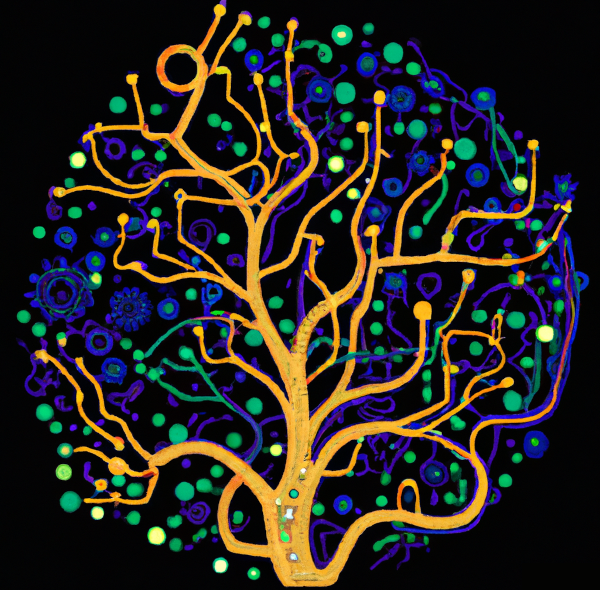Podcasts
Projects | | Links: Developer Stories

We support our community podcasts that feature members of the HPC community!
The following podcasts have featured members of HPC community, and are listed in alphabetical order. Want to add a podcast to this list? Let us know!
Developer Stories
As developers, we get excited to think about challenging problems. When you ask us what we are working on, our eyes light up like children in a candy store. So why is it that so many of our developer and software origin stories are not told? How did we get to where we are today, and what did we learn along the way? This podcast aims to look “Behind the Scenes of Tech’s Passion Projects and People.” We want to know your developer story, what you have built, and why. We are an inclusive community - whatever kind of institution or country you hail from, if you are passionate about software and technology you are welcome!
Recent episodes that featured HPC community projects and people have included:
- Dr. Cuff: A look behind the scenes of our beloved Dr. Cuff
- Tech Horror Stories: with many happening in a server room!
- 300 Nodes in a Closet: Fernanda’s journey into high performance computing.
And browse more episodes at the show site!. Information about the show and how to be featured as a guest is on the about page.
HPCwire “This week in HPC” Podcast
Media/Industry podcast from HPCwire - “Since 1987 - Covering the Fastest Computers in the World and the People Who Run Them”.
InsideHPC Podcast
Media/Industry podcast from InsideHPC - “At the Convergence of HPC, AI and Quantum”. Featuring @HPCpodcast and “HPC News Bytes”.
Let’s Talk Exascale
ECP’s Let’s Talk Exascale podcast goes behind the scenes to chat with some of the people who are bringing a capable and sustainable exascale computing ecosystem to fruition. Discussions revolve around the challenges, successes, and expected impact of the project.
Recent episodes that featured HPC projects included:
- Episode 100: Reflecting on the ‘Why’ behind Supercomputing Simulations: Advancing Science
- Episode 99: ECP’s WarpX Team Successfully Models Promising Laser Plasma Accelerator Technology
- Episode 98: Providing Exascale-Class Multiphysics Simulation Capability to Multiple Science Domains
Contact the Let’s Talk Exascale podcast at ECP-communications@ornl.gov
Science in Parallel
Science in Parallel focuses on the people of computational science and their interdisciplinary research to simulate climate change and the cosmos, understand viral infections, build alternative energy strategies and more – all using high-performance computing (HPC). Season 1 celebrated the 30th anniversary of the Department of Energy Computational Science Graduate Fellowship (DOE CSGF) program and was shortlisted for 2022 Best Technology Podcast from the Publisher Podcast Awards. Season 2 will highlight how the COVID-19 pandemic has reshaped computational science workplaces and careers, with in-depth conversations about HPC’s future. Science in Parallel Season 2 focused on HPC workforce and workplace changes since 2020. Notable episodes include:
- Future of Work Part 1 and Part 2 examine the impact of remote work on computational science and HPC and featured Elaine Raybourn of Sandia National Laboratories among others.
- Two PhDs + Pandemic + Baby features an interview with two computational science Ph.D. students who talk about how COVID-19 shaped their career paths and perspectives on life and work.
- In You’re Moving to Finland? Jeff Hammond of NVIDIA discusses career changes and his big move to Finland in 2021.
- Improving Computing Performance and Workforce Diversity features an interview with Valerie Taylor of Argonne National Laboratory about the Threadwork project and her work to support underrepresented communities in computing.
- Pushing Limits in Computing and Biologyfeatures an interview with Anda Trifan (now a computational sciences investigator at GSK) and Amanda Randles of Duke University.
Browse more episodes on the show page or also find your favorite podcast subscription service there!
Scigeeks’ Podcast
Get ready to geek out with us on Scigeeks’ Podcast! This podcast series is all about exploring the intersection of technology and science. Our guests will dive into the latest advancements in computing that are changing the game for scientists, researchers, and innovators alike. From machine learning algorithms to genAI applications, from cloud to HPC systems (usually also together), we’ll cover it all. Thought-provoking conversations, expert insights, and a passion for making science more efficient, effective, and exciting! Start from some notable episodes presenting the idea of Virtual Nodes for pods on Supercomputers:
- Democratizing Access to Advanced AI: The Future of GPU provisioning
- MLFlow while running on a SuperComputer with Matteo Bunino from CERN
- Kubernetes Meets High-Performance Computing: A New Era for Pods
Supercomputing in Europe Podcast
New episodes every 2 weeks! In this podcast we talk about all things supercomputers. In our episodes we are interviewing guests from all around Europe who are going to talk about their work and hopefully clear misconceptions in multiple fields such as life science, machine learning, engineering, data science, quantum computing and more.
